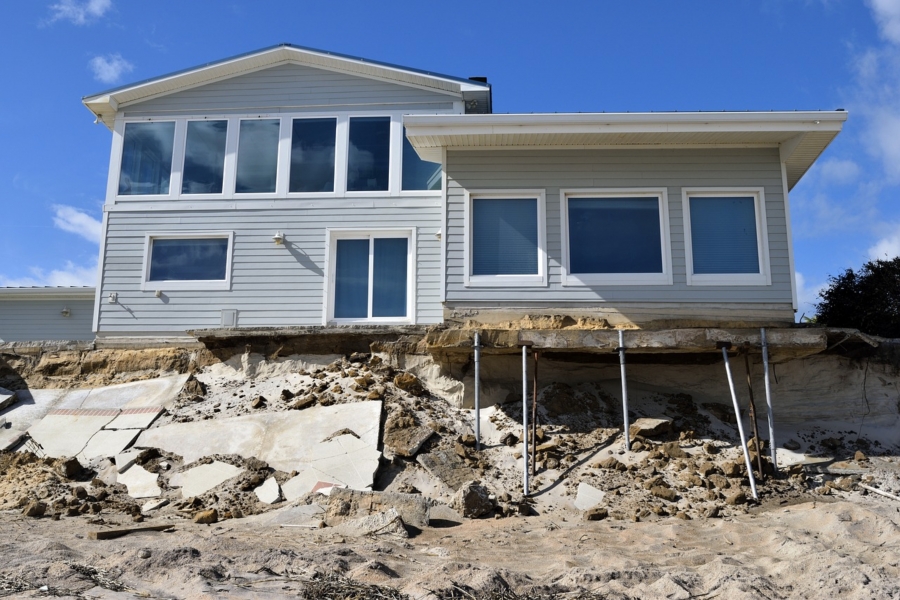Unfortunately, Hurricane season is upon us, and while nobody wants to be affected by the effects of a natural disaster, it is a harsh potential reality. Inspecting the physical condition of modern concrete home is an important part of the home-buying process and should be included in your purchase contract as a condition of closing the sale. One or more professional inspectors should look for defects or malfunctions in the building's structure, systems, and physical components, such as the roof, plumbing, electrical and heating/cooling systems, floor surfaces and paint, windows and doors, and foundation, and detect pest infestations or dry rot and similar damage.
The inspector should also examine the land around the house for issues concerning grading, drainage, retaining walls, and plants affecting the house.
Even if the seller provides you an inspection report, it's best not to rely on this alone -- the seller may have chosen an inspector who's not known for rooting out problems.
1. Foundation Failures
Heavy accumulations of water can cause house foundations to become weak and fail. Check your house carefully by looking along both outdoor and indoor walls for any areas that may be cracked or bulging. If things look good for now, check again over the next several weeks. For optimal sustainable construction practices, the house siding should also be given careful consideration.
But when choosing the right siding for the house, it is important to note which types are eco-friendly and also sustainability and durability in each kind. This is also why lap siding for houses is an important exterior structure of the house and should be weather resistant and require low to moderate maintenance.
If you see anything out of the ordinary during your storm damage inspection, don't make any repairs yourself. Call in an expert, such as a professional home inspector, for advice before any repairs are started.
2. Flooded Fixtures
Any electrical component, Ike an outlet, appliance or furnace that has been below flood waters should be replaced. Contaminants in the water can cause serious damage to sensitive electrical components. Besides malfunctioning, they could even result in electrical fires.
If your heating system has been flooded out, have it checked by an expert heating and cooling contractor or home inspector. In many cases, individual parts can be changed without it becoming necessary to replace the entire unit.
Most outdoor wood flooring finishes allow some water to penetrate; if the water goes on soaking the frames and wall sheathing, problems like mold growth and dry rot can occur. Houses that make use of house wrap use it to prevent water passing through the siding and facilitates its draining away from the main structure.
3. Basement Blues
If your basement has flooded from a natural disaster, don't panic. Severe weather can cause even the driest basement to turn into an indoor swimming pool. Remove damaged belongings and dry the basement with fans. Then, avoid future problems by fixing an outdoor wood flooring and checking outside for any loose or disconnected gutters and fix any that you find.
Look for washed out soil along the foundation walls. If this has happened, re-grade the area by adding clean fill dirt and slope it away from the house to prevent any future storm damage.
4. Windward Woes
Severe winds can rip through the outer skin of your house and cause destruction in many areas. During your storm damage inspection, examine every side of your house from the ground. Check for loose siding, metal trim, and loose soffits. If these parts are loose or missing, leaks can develop. Look for cracked, loose or broken window panes and fix any you find.
Check the closers and safety chains on storm windows. Wind can cause shingles to blow off and roof antennas to collapse. Even the best modern concrete home roofs can leak under extreme conditions. Driving rain can "push up" under the roof shingles and result in major leaks. Most exterior finishes allow some water to penetrate; if the water goes on soaking the frames and wall sheathing, problems like mold growth and dry rot can occur.
5. Get a Pest Report
In addition to the general inspector, it's wise to hire a licensed structural pest control inspector, who will create a special pest report on the property. The pest inspector will look for infestation by wood-boring insects such as termites and flying beetles, as well as evidence of dry rot and other fungal conditions. Some general contractors are also licensed pest control inspectors, but they will normally charge extra for doing double duty. Be sure you get a written report of all inspections.
Cleaning Up
When cleaning up after a natural disaster, be sure to use outdoor wood flooring, fix your house wraps and a good quality disinfectant on all floor and wall surfaces. Flood waters can be contaminated with all sorts of bacteria that can be an unwelcome guest in your home. When using commercial disinfectants, make sure you ventilate the house or use an environmentally safe mix of one cup of Borax in a bucket of hot water.
According to Corey Tyner of Cash Land Buyers Arizona and Austin Fast Sell Home Buyers, depending on the property and your personal sensitivities, you may want to arrange specialized inspections for hazards from floods, earthquakes, and other natural disasters. The same goes for environmental health hazards such as mold, asbestos, and lead. And, if the general inspection revealed problems with the roof, foundation, or other areas that are hard to access or potentially expensive to repair, you may also want to hire a specialized inspector.
If you have been affected by a severe weather event and find that doing a natural disaster inspection and checking your home for needed repairs is more than you can handle, do not hesitate to reach out for help.








